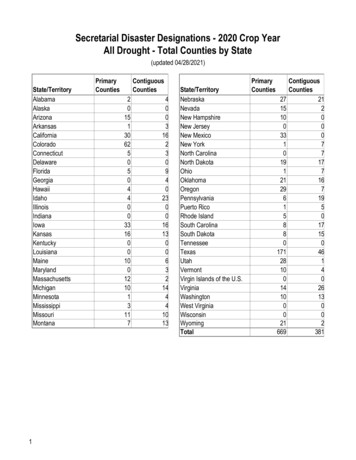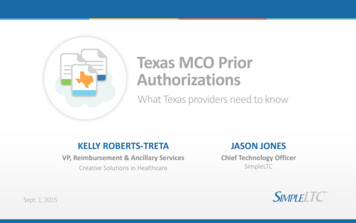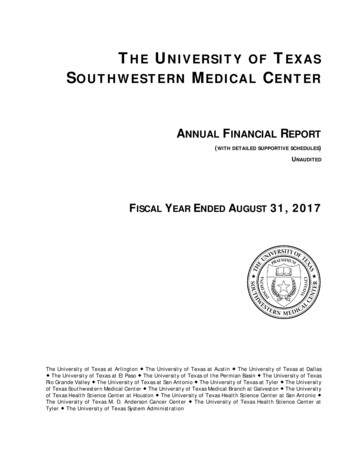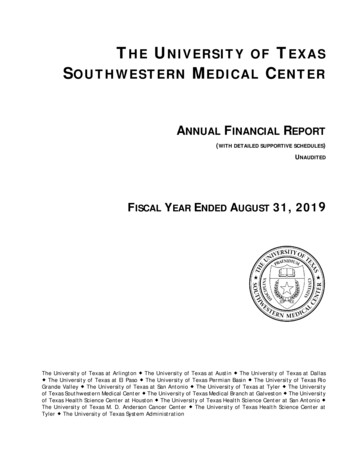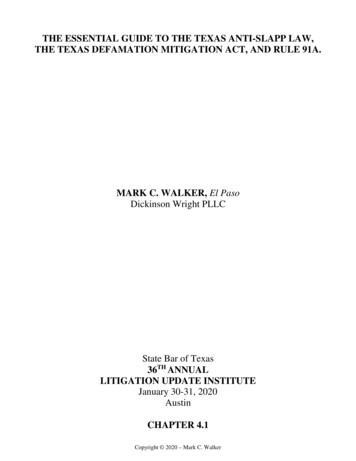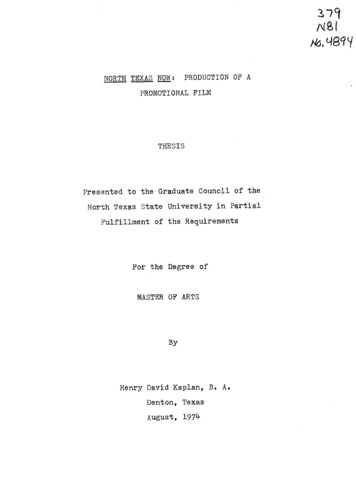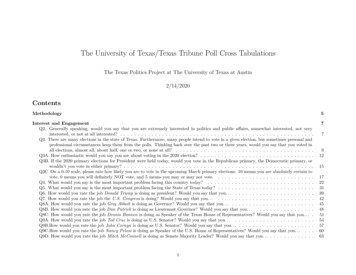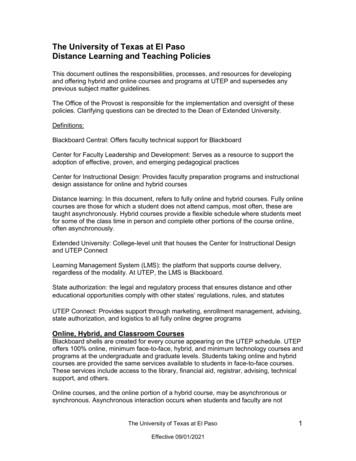
Transcription
The University of Texas at El PasoDistance Learning and Teaching PoliciesThis document outlines the responsibilities, processes, and resources for developingand offering hybrid and online courses and programs at UTEP and supersedes anyprevious subject matter guidelines.The Office of the Provost is responsible for the implementation and oversight of thesepolicies. Clarifying questions can be directed to the Dean of Extended University.Definitions:Blackboard Central: Offers faculty technical support for BlackboardCenter for Faculty Leadership and Development: Serves as a resource to support theadoption of effective, proven, and emerging pedagogical practicesCenter for Instructional Design: Provides faculty preparation programs and instructionaldesign assistance for online and hybrid coursesDistance learning: In this document, refers to fully online and hybrid courses. Fully onlinecourses are those for which a student does not attend campus, most often, these aretaught asynchronously. Hybrid courses provide a flexible schedule where students meetfor some of the class time in person and complete other portions of the course online,often asynchronously.Extended University: College-level unit that houses the Center for Instructional Designand UTEP ConnectLearning Management System (LMS): the platform that supports course delivery,regardless of the modality. At UTEP, the LMS is Blackboard.State authorization: the legal and regulatory process that ensures distance and othereducational opportunities comply with other states’ regulations, rules, and statutesUTEP Connect: Provides support through marketing, enrollment management, advising,state authorization, and logistics to all fully online degree programsOnline, Hybrid, and Classroom CoursesBlackboard shells are created for every course appearing on the UTEP schedule. UTEPoffers 100% online, minimum face-to-face, hybrid, and minimum technology courses andprograms at the undergraduate and graduate levels. Students taking online and hybridcourses are provided the same services available to students in face-to-face courses.These services include access to the library, financial aid, registrar, advising, technicalsupport, and others.Online courses, and the online portion of a hybrid course, may be asynchronous orsynchronous. Asynchronous interaction occurs when students and faculty are notThe University of Texas at El PasoEffective 09/01/20211
required to be online at the same time. Synchronous interaction occurs when studentsand faculty are required to be present simultaneously using computer or video-basedcommunication media.Students enrolled in 100% online courses and minimum face-to-face are assessed adistance learning fee of 75/SCH at the undergraduate level and 100/SCH at thegraduate level. These fees support the costs of online course development, delivery, andcontinuous improvement. These fees are subject to change per the course fee reviewprocess.When registering for courses, students can identify the instructional method of courseson Goldmine according to the following tags:100% online: Online courses are web-based with no face-to-face contact betweenstudents and faculty. Courses are supported by a learning management system (LMS)where instruction occurs through either asynchronous or synchronous interaction.Min Face-to-Face: Minimal face-to-face courses are primarily online courses with 86 to99% of the course work occurring online.HYBR: Hybrid courses are characterized by having 50 to 85% of the course activitiesonline with the remaining time in face-to-face classroom meetings.Min Tech: Face-to-face courses with 49% or less of the course delivered online.These courses are taught using traditional classroom meetings in physical locations onor off campus between students and instructors.Regulatory RequirementsAccreditation DemandsThe Southern Association of Colleges and Schools Commission on Colleges(SACSCOC) does not differentiate between standards for assessment of hybrid, online,and face-to-face courses. Therefore, online and hybrid courses must meet the samestandards as an equivalent face-to-face course. If an institution cannot assure that thestandards for a hybrid or online course are equivalent or superior to those adopted forthe same face-to-face course, the course is inappropriate for online delivery.State AuthorizationUTEP is committed to complying with rules and regulations regarding the operation ofhigher education institutions in every state in which it enrolls students. This practice,known as State Authorization, relates to all out-of-state activities ranging from fully onlineprograms to experiential learning placements, or internships, - regardless of coursemodality - and many other activities in between. For certain courses/programs, includingthose in professional licensure fields, additional authorizations and/or disclosures maybe required. UTEP Connect will review and complete authorizations for all UTEPprograms with out-of-state activities. UTEP Connect can only do this with thecooperation of all units with out-of-state activities, including those without UTEP Connectprograms. See the Extended University website for more information.The University of Texas at El PasoEffective 09/01/20212
Student PrivacyOnline student privacy must be maintained at all times by keeping grades secure in thelearning management system. Grades must not be viewable to other members of thecourse. No student grades or information may be posted outside of secured systems anytime during or after the semester.If external tools (wikis, blogs, etc.) or recorded sessions are used, the faculty membermust ensure that Family Educational Rights and Privacy Act (FERPA) requirements aremet. In most cases, it is acceptable for faculty to ask students to create and comment onwikis and blogs. However, students should not be required to post information that isprotected under FERPA (class schedule, for example). Faculty comments and grades onstudent work should never be made public. As a solution, faculty should inform studentsthat their work may be public and provide students with information on making their wikisand blogs private.Faculty cannot require students to reveal private information to the class and shouldrespect students’ requests to not post information for class viewing. If a student requeststo not share a personal photo or reveal one’s identity, for example, faculty shouldprovide an alternative assignment with similar weight.The Online Learning Student Privacy & Related Issues FAQ provided by UTSystem Online Education Task Force is an excellent resource for faculty andadministrators regarding maintaining student privacy.AccessibilitySection 508 of the American Disabilities Act (ADA) requires instructors to provide equalaccess to course materials for all students. The Center for Instructional Design (CID)assists faculty in making sure their online courses are accessible to all students. Onlinestudents requiring an accommodation should work with the Center for Accommodationsand Support Services.Intellectual PropertyUniversity rules pertaining to intellectual property can be found in Chapter 4 of theHandbook of Operating Procedures. UT System Board of Regents policies regardingintellectual property can be found in Section 90101.Copyright of Course MaterialsThe TEACH Act (Technology, Education, and Copyright Harmonization) providesguidance for academic institutions relative to copyright regulations. Under the TEACHAct, it may be permissible to make some copyrighted materials available to students ifthey are: Directly related and integral to the course contentAccessible only by students enrolled in the courseRetained only for the duration of the classDoes not exceed the length or amount displayed in a face-to-face classStudents should be made aware of the institution’s copyright policies, specifically thatcourse content may subject be to copyright laws and protections.The University of Texas at El PasoEffective 09/01/20213
Academic AdministrationOnline Course DevelopmentAny course taught online for the first time must complete the full approval process beforeit can be placed on the semester schedule. Access and complete the following form:Online Course Development Proposal to begin the processDue to the time and effort involved in ensuring course quality and accessibility, facultyshould allow for at least four months development time before offering a new onlinecourse. All courses developed with the support of UTEP instructional designers will bedeveloped under a Joint Creation and Ownership Agreement between UTEP and theresponsible faculty member. Approximately two weeks prior to course start, a CourseQuality Rubric (CQual) and Technical Review will be performed by CID, and feedbackwill be provided to the instructor. After the course review is completed, CID staff areremoved from the Blackboard course shell to accommodate FERPA regulations.Online Course Approval and RoutingThe creation of new courses, independent of delivery format, is initiated at the academicdepartment level and is subject to approval. (See Curriculum Changes.)The approval process for online and hybrid courses varies depending on whether thecourse exists in the UTEP inventory of courses.Conversion of existing courses occurs when courses are included in the UTEPcatalog but have not previously been developed for online delivery. Proposals for theconversion of existing face-to-face or hybrid courses to online must originate from theresponsible faculty member and be approved by the department chair, college dean, andthe Vice President for Academic Affairs. The proposal is then reviewed by the CID andExtended University to determine the production schedule.Special topics courses will be treated as new courses when the topic of the coursechanges, making them subject to the online course approval process.New online courses must first be approved through the standard curriculum process.Proposals to develop the new course online must originate from the responsible facultymember and be approved by the department chair, college dean, and the Vice Presidentfor Academic Affairs. The proposal is then reviewed by the CID and Extended Universityto determine the production schedule. Production will not begin until the course hasreceived its final curricular approval.Online Program Approval and RoutingThe process for online program approvals varies depending on whether the programalready exists in the UTEP catalog. Prior to developing an online program, faculty shouldparticipate in a course-mapping workshop.Conversion of existing programs occurs when programs are included in the UTEPcatalog but have not been developed for online delivery. Proposals for the conversion ofan existing program to online or hybrid delivery must originate from the departmentThe University of Texas at El PasoEffective 09/01/20214
chair, through the college dean, and be approved by the Provost in consultation with theDean of Extended University. If a program requires curricular modifications, it must gothrough the appropriate approval process at the college and university levels. The UTEPConnect memorandum of understanding must be signed before course development,marketing, or recruitment begins. Program directors should also contact the Director ofAcademic Reports and Curriulcum to facilitate notification to the Texas Higher EducationCoordinating Board at least 90 days prior to its start date.New online programs do not exist in the UTEP catalog. These must be approvedthrough the standard curriculum process. Once reaching final approval, notice must besent to Extended University for consultation and scheduling of development. The UTEPConnect memorandum of understanding must be signed before course development,marketing, or recruitment begins.Please see Curriculum Change Procedures for more information.Academic CalendarOnline courses adhere as closely as possible to the traditional academic calendar. Mostrun for 7, 8, 14, or 16 weeks in the fall and spring semesters with additional parts of termin the summer. The academic calendar is available at the Registration and Recordswebsite.Faculty GuidelinesOnline FacultyFaculty who teach online courses are appointed and credentialed by their academicprogram and college/school.Faculty CredentialingAccreditation agencies require that faculty are well prepared to teach hybrid and onlinecourses. Through CID and CFLD, UTEP provides instruction in effective hybrid andonline design and teaching that meets SACSCOC accreditation standards. This trainingincludes skill enhancement in instructional design and pedagogy, course managementstrategies, assessment of hybrid and online course effectiveness, online coursemanagement system tools, and policies and guidelines for academic integrity. Instructorsshould also apply the Texas Higher Education Coordinating Board's(THECB) Principles of Good Practice to ensure that course assessments achieve thenecessary learning outcomes.To begin course development and be credentialed for online course instruction, facultymembers must complete both Blackboard Self-Paced Course, offered throughBlackboard Central, and the Teaching Online Academy, offered through CID. Both areoffered online. The Blackboard Self-Paced Course may be taken at any time. TheTeaching Online Academy is offered multiple times a year. Additional assistance can beprovided by CID and Blackboard Central as needed. Multiple workshops are alsoprovided throughout the fall and spring semesters. Faculty are also encouraged to enrollin the Hybrid Academy prior to developing and teaching a hybrid course.The University of Texas at El PasoEffective 09/01/20215
Faculty ResponsibilityFaculty are responsible for establishing the course learning objectives and the coursecurriculum, assessing the learning outcomes, providing timely responses to students,and submitting final grades.Class SizeMaximum class size is determined by the academic program delivering the course;however, student demand may require maximum class size to be flexible. Depending onthe department, graduate teaching assistants or coaches (via a third-party resource,Instructional Connections) may be available to assist with course responsibilities asdetermined by the instructor. If Instructional Connections coaches are desired, therequest should be made through Extended University no fewer than two weeks prior tothe course start date. The request for coaches can be found on the UTEP Connectwebsite.Online Office Hours and Student Expectations for ResponseAs indicated in the UTEP Handbook of Operating Procedures (HoOP), faculty shouldpost a schedule of regular office hours that is convenient to students and meetsdepartmental requirements. Faculty are expected to be available at the times indicated.A reasonable guideline for minimum office hours is 0.7 scheduled office hours per eachsemester credit hour for which the faculty is formally responsible. For online classes,faculty should make themselves available to students via phone, email, chat,videoconferencing tools, or other technologies.Faculty must clearly indicate in their course materials the expectation for response tostudent requests. Generally speaking, faculty should respond to student emails andquestions within 24 to 72 hours.Academic Integrity of Online CoursesOnline and face-to-face courses should have the same learning outcomes, coursedescriptions, and expectations. Faculty should ensure that the quality and rigor of anonline course is no less than that of its face-to-face equivalent.Course/Faculty EvaluationStudents evaluate online courses using the course evaluation procedures in effect forcampus-based courses. Student evaluations are completed online for all courses.Results are made available to the instructor via my utep. Additionally, faculty areencouraged to reach out to students mid-semester to gain feedback in the form ofBlackboard’s anonymous surveys and low-stakes discussion boards.Student Grade InquiriesIt is best practice to address grade inquires via Blackboard’s course messages or viaZoom web conference). To maintain student privacy, discussing grades via email orphone is not recommended.Student Drops and WithdrawalsOnline courses follow the same regulations as face-to-face courses regarding facultyand student initiated course drops and withdrawals. Deadlines for both can be found onacademic calendar on the UTEP Registration and Records website.The University of Texas at El PasoEffective 09/01/20216
Faculty CompensationFull-time faculty teaching online courses receive no additional compensation for coursestaught as part of their regular load. In the case of a full-time faculty teaching the courseas an overload, additional payment within university policy may be requested. Part-timefaculty teaching an online class will be compensated at the same rate as a face-to-facecourse. Faculty developing a course for a fully online degree program may be eligible fora course development stipend upon completion, with approval of the program chair.Use of Student WorkWhen faculty wish to use student work for any purpose outside of course or programassessment such as research or for pedagogical purposes, they must request thestudents' permission. To use student work used in any research-relatedproject (professional/academic presentations, publications, posters, etc.), faculty shouldfollow the Institutional Review Board (IRB) process for human subject research includingrequesting that students complete an IRB approved consent form. When seeking to usestudent work for publication or pedagogical reasons (e.g., examples of effectiveprojects), the Student Authorization and Waiver for Release of Education Records forPublication of Student Authored Materials form should be completed.Ownership of Educational MaterialsThe Joint Creation and Authorship Agreement must be signed by the faculty memberdeveloping the course and a representative before a new online course is scheduled. Toaccess the form, visit the Center for Instructional Design.Student GuidelinesStudent SupportStudents enrolled in online courses and programs are provided access to studentservices available at UTEP. This includes, but is not limited to: the library, the UniversityWriting Center, the UTEP Bookstore, the Center for Accommodations and SupportServices, Career Services, and the Miner Learning Center.Questions regarding Blackboard, UTEP email, and other technological issues can besent to the UTEP Helpdesk via phone, email, or chat.State AuthorizationIn order to comply with federal requirements regarding state authorization, UTEP mustknow where its students are located. All students are expected to maintain and updatetheir current location and mailing address within UTEP’s student information system.Academic Integrity and Scholastic DishonestyOnline students are held to the same academic integrity policies as face-to-facestudents. Scholastic dishonesty includes cheating, plagiarism, and collusion. Facultyshould take measures to deter cheating as much as possible (unique assignments,proctored exams, random test or quiz questions, plagiarism checkers, etc.). UTEP’sjudicial process will be followed when academic dishonesty is suspected. In this case,faculty are to collect evidence and submit it to the Office of Student Conduct and ConflictResolution (OSCCR). Faculty may not assign penalties (in the form of reduced points orThe University of Texas at El PasoEffective 09/01/20217
grades) for inappropriate academic behavior. OSCCR will investigate the charge,determine the appropriate course of action and notify the student and faculty.Student OrientationThe Blackboard Student Orientation is available on the CID website for all students.Online students are strongly encouraged to access the orientation within the firstsemester of coursework.Class AttendanceStudents are expected to attend their online class regularly by participating in activitiessuch as submitting assignments, engaging in discussion boards, completing exams,attending online chats, and so on. Simply logging into the course does not count asattendance.Other Course ProvidersOnline courses offered by other UT System institutions are available to students throughFinish@UT. To enroll in one of these courses, students must complete an onlineRegistration Request using the Texas Information System (TIS). Students who enroll inthese courses are subject to the host university’s deadlines, academic calendar, tuitionand fee rates, and policies, which may be different from those at UTEP.Online Student ComplaintsUTEP’s policies and procedures for handling student academic and non-academiccomplaints are applicable to all students, including those enrolled in distance educationprograms and courses. Students with complaints about distance education delivered byUTEP Connect should follow the process described in the UTEP Undergraduate andGraduate Catalogs and UTEP’s Handbook of Operating Procedures.If an issue cannot be resolved internally/locally, a student may also file a complaint withthe designated agency in the state where he or she is receiving instruction. A complaintmay also be filed with UTEP's accrediting agency. Students located within a state with aState Authorization Reciprocity Agreement (SARA) may file a complaint through theTexas SARA portal. More information including information about various state agenciescan be found on the UTEP Connect website.Hybrid and Online Course DeliveryLearning Management SystemAll hybrid and online courses must be delivered via Blackboard, the learningmanagement system (LMS) supported by UTEP. To ensure integrity of the courses, atleast 90% of the course content must reside within the LMS and be accessible only viasecure login and password unique to each UTEP student and employee.Course QualityIn accordance with the Texas Higher Education Coordinating Board's(THECB) Principles of Good Practice and SACSCOC accreditation standards, theacademic department delivering hybrid and online courses and programs has finalresponsibility for ensuring pedagogical quality.The University of Texas at El PasoEffective 09/01/20218
Hybrid and online courses and programs may be subject to assessment and programreviews as established by the Office of the Provost and Vice President for AcademicAffairs.Student AuthenticationThe SACSCOC Distance and Correspondence Education Policy Statement requires that“institutions demonstrate that the student who registers in a distance or correspondencecourse or program is the same student who participates in and completes the course orprogram and receives the credit by verifying the identity of a student who participates inclass or coursework by using, at the option of the institution, methods such as 1) asecure login and pass code 2) proctored examinations and 3) new or other technologiesand practices that are effective in verifying student identification.”Students gain access to Blackboard, through which all online courses are conducted, byentering their UTEP username and password. Faculty are thus encouraged to use atleast one additional process to verify that students participating in online courses are thesame as the students enrolled in the course. The faculty and/or academic programshould identify this process. The verification requirement must be clearly stated in thesyllabus or other course documents, and according to SACSCOC, if faculty membersrequire a student verification process that incurs a monetary charge, that informationmust be conveyed to students at the time of registration or enrollment (i.e., posted in asyllabus made available prior to enrollment).Options for student verification include: Verification of approved photo ID through a web camProctoring of exams or other projects through a web camSynchronous or asynchronous activities requiring an approved photo IDField or clinical activities requiring a photo ID at arrivalOther process defined by the faculty or programPhoto IDs may include: driver’s license, military ID, passport, government-issuedidentification, or a Miner Gold Card for on-campus students.The CID is available to assist faculty with the selection of the verification tool and theimplementation of the process.ResourcesFamily Educational Rights and Privacy Act (FERPA)National Council for State Authorization Reciprocity AgreementsSACSCOC Distance and Correspondence Education Policy StatementSection 508 of the Americans Disabilities ActThe TEACH ActThe University of Texas at El PasoEffective 09/01/20219
UTEP Extended UniversityUTEP Handbook of Operating ProceduresUTEP Human Subject ResearchUTEP Office of Student Conduct and Conflict ResolutionUniversity of Texas System Online ConsortiumPolicy Review ResponsibilityResponsible parties Dean of Extended University Office of the Provost and Vice President for Academic Affairs Review periodAnnually on or before June 30th for an effective date of 09/01The University of Texas at El PasoEffective 09/01/202110
The University of Texas at El Paso Effective 09/01/2021 1 The University of Texas at El Paso Distance Learning and Teaching Policies . This document outlines the responsibilities, processes, and resources for developing and offering hybrid and online courses and programs at UTEP and supersedes any previous subject matter guidelines.


